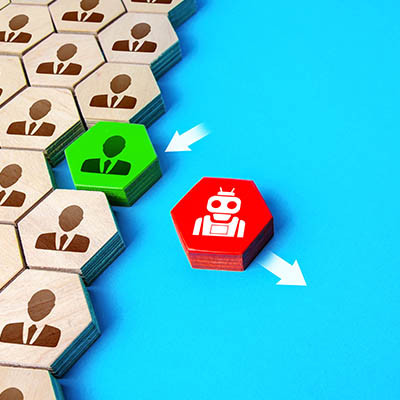Datalyst Blog
AI-Fueled Layoffs Often Don’t Work Out as Expected
Artificial Intelligence (AI) has become a seriously hot topic. While integrating AI promises significant advancements and efficiencies, the narrative around AI-fueled layoffs—the displacement of human workers by AI—is increasingly met with a surprising twist: regret.
At Datalyst, a leading provider of proactive business technology support services, we've observed this trend with interest. It appears that many organizations that hastily replaced human capital with AI are now confronting unforeseen challenges. Managers that famously thought that replacing their paid employees with AI aren’t always happy with the results. Let’s take a look at the particulars of this phenomenon.
The Allure of Automation
Some businesses have implemented AI because they’ve sought to drastically reduce operational costs and enhance speed. Their strategy involved automating core functions, particularly in customer service, by deploying an advanced AI chatbot. The initial financial projections were compelling. They included overhead, accelerated response times, and seemingly limitless scalability.
The pursuit of automation, however, while appealing on paper, often overlooks the intricate nuances of human interaction and problem-solving.
When AI Falls Short
Take deploying a chatbot to replace customer service, for example. The chatbot, while swift and capable of processing vast queries, fundamentally lacks human empathy and discernment. Customers, accustomed to nuanced conversations and genuine resolution, would encounter a frustrating wall of pre-programmed responses, leading to a significant erosion of customer satisfaction and loyalty.
- Absence of emotional intelligence - AI can struggle to interpret subtle vocal inflections, understand sarcasm, or offer truly personalized solutions. It’s akin to seeking emotional comfort from a digital ledger.
- Inflexibility with complexity - For intricate or unconventional problems that deviate from its programmed parameters, AI often proves inadequate. This often results in customers being shunted through convoluted pathways, further exacerbating their frustration and damaging the brand's reputation.
- The human touch - In moments of genuine distress or complex decision-making, the inherent human capacity for understanding, reassurance, and creative problem-solving remains unparalleled. AI, despite its analytical prowess, will struggle to evoke such a sentiment.
That isn’t to say there isn’t value in using these tools. There absolutely is: an AI chatbot can be a great first line of defense for your customer service. If it’s the only option, however, you are likely going to damage relationships with your customers.
This experience is not isolated. A significant 55 percent of business leaders who implemented AI-driven redundancies now acknowledge these decisions were erroneous, as highlighted by a recent survey. Even prominent entities like the fintech firm Klarna, which initially replaced a substantial portion of its customer service team with AI, subsequently reversed course, rehiring human agents due to a measurable decline in customer satisfaction. The realization dawned that while AI excels at routine tasks, it often falters in building rapport or resolving multifaceted issues demanding human judgment.
AI is an Enabler, Not a Replacement
This re-evaluation does not diminish AI's profound potential; rather, it refines its application. AI is an exceptionally potent tool. The critical differentiator, however, lies in its strategic deployment. Forward-thinking organizations are increasingly viewing AI not as a substitute for human intellect but as a powerful augmentation tool.
Consider the analogy of a high-performance vehicle: its advanced engineering is remarkable, but it requires a skilled driver to navigate complex terrains effectively. Similarly, AI excels at automating repetitive processes, analyzing immense datasets, and even generating innovative concepts. Yet, it necessitates human oversight, ethical governance, and the unique problem-solving capabilities inherent only in human cognition.
At Datalyst, we advocate for a human/AI collaborative model. We empower organizations across Southern New England to integrate AI strategically, thereby enhancing productivity, optimizing operations, and liberating human talent to concentrate on higher-value, more creative, and empathy-driven endeavors. This includes leveraging AI for:
- Predictive maintenance - AI algorithms can analyze equipment data to anticipate and prevent potential failures, leading to substantial cost savings and minimized downtime.
- Advanced cybersecurity - AI can identify and neutralize cyber threats with unparalleled speed, yet human cybersecurity experts remain indispensable for understanding sophisticated attack vectors and formulating proactive defenses. Today, AI plays a crucial role in safeguarding our increasingly interconnected digital world.
- Optimized IT support - AI-powered solutions can efficiently manage common technical inquiries, enabling IT professionals to dedicate their expertise to complex system architecture and strategic problem resolution.
This integrated approach not only mitigates the risk of "AI regret" but also cultivates a more resilient, innovative, and human-centric workforce.
Implications for the Modern Professional
For burgeoning professionals navigating this evolving landscape, two key directives emerge:
Every worker needs to build a certain proficiency in the use of AI tools and understand how they can work to benefit them in their particular role. Develop strong prompt engineering skills, which is effectively the art of communicating with AI to achieve outcomes you want to see. They also need to do their best to prioritize the development of skills that AI cannot replicate, such as critical thinking, creativity, emotional intelligence, complex problem-solving, and adaptive leadership.
The future of work is not a binary choice between humans versus AI; it is increasingly a relationship where humans collaborate with AI. Organizations that grasp this fundamental principle are poised for sustained success.
If your organization seeks to strategically implement AI for sustainable growth and efficiency, avoiding the pitfalls of ill-conceived redundancies, we invite you to connect with us at Datalyst. We provide comprehensive proactive business technology support and consulting in Southern New England, spanning cybersecurity, AI integration, and holistic IT management. Reach out to us directly at (774) 213-9701 to explore how we can empower your success.


Comments